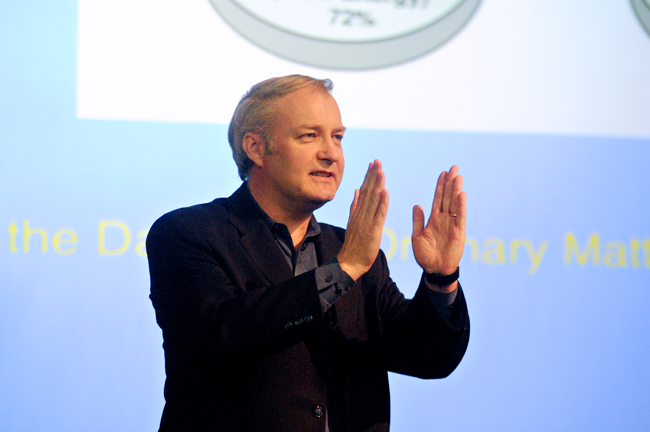Emerging technology at UT is playing a critical role in new astronomical research aimed at answering humanity’s most meaningful questions, a University astronomy professor said.
Volker Bromm, associate professor in the Department of Astronomy, discussed the formation of the early universe inside a packed AVAYA Auditorium as part of the 21st annual Great Lecture in Astronomy on Saturday afternoon.
Bromm’s lecture focused on the initial sources of light that ended the cosmic “dark ages.” The lecture also focused on emerging astronomical technology.
Bromm said astronomy has entered into a golden age of discovery, made possible by the confluence of emerging technologies.
“To answer big questions, you need to have the right tools,” Bromm said. “We need the supercomputers to make the predictions, and you need the telescopes to get you back in time to the first moments of star formation.”
Bromm used large-scale supercomputer simulations created at the Texas Advanced Computing Center to visually represent the formation of early stars and galaxies. He described new telescopes that will supplement ongoing research into the early universe, including the James Webb Space Telescope, which is set to launch in 2018, and the Giant Magellan Telescope, of which UT is a founding partner.
“The next few years will be incredibly important,” Bromm said. “Incredibly exciting for astronomy because for the first time, I believe we have the chance to answer some of those questions that humans have had over millennia.”
Physics freshman Max Parks was among several students that attended the lecture. Parks said he was not aware of the computing power the University has access to.
“As a student, it’s exciting to see all these areas where UT is excelling at a rapid pace,” Parks said. “It’s always great for me to find out about huge leaps we’re taking not only in the entire field of science, but also just here at UT.”
Bromm said the University is in a unique position to motivate undergraduate and graduate participation in astronomy.
“I think UT, in principle, is able to play big,” Bromm said. “It’s very motivating to students if you can tell your undergrad side and your grad students that [major] discoveries are made here.”
Published on February 11, 2013 as "Supercomputers answer questions about formation of universe".





















